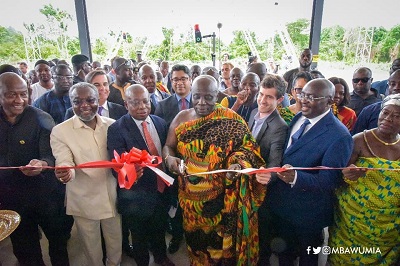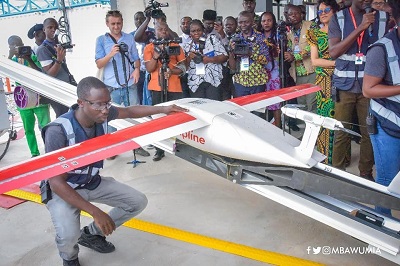
.To supply vaccines, blood products for emergencies
.Deliver to 2,000 health facilities
A medical drone delivery service has been added to the country’s healthcare delivery architecture to supply hospitals and other health facilities in the rural parts of the country on time to deal with emergency situations.
The medical drones, which travel at 110km per hour, will supply 148 different vaccines, blood products, and other medications to district and rural health facilities to enable them deal with emergencies such as snake bites, child births, and accidents.
The project, which was launched by Vice President Dr Mahamudu Bawumia at Omenako in the Eastern Region yesterday, is expected to operate 24 hours a day, seven days a week, from four distribution centres.
Each distribution centre would be equipped with 30 drones, deliver to 2,000 health facilities, and, together, serve about 12 million people across the country.
Speaking at the launch, Vice President Bawumia commended Zipline, the company managing the project on behalf of the government, indicating that a lot of preparations had been done for the smooth take-off of the project.
He said Ghanaians constituted 100 per cent of the operational team executing the project and indicated that the project was meant to expand access to basic healthcare to save lives.
The various programmes and projects of the President Nana Addo Dankwa Akufo-Addo administration were targeted at addressing inequalities and enhancing social inclusion, leaving no one behind, he said.
Vice President Bawumia noted that the medical drone project was part of the government’s efforts to use technology to improve the quality of life, just like the introduction of the national identification, digital address, telecommunications and interoperability, among others.
He said the government was implementing programmes to improve healthcare delivery in the country including the introduction of a paperless record keeping system at the hospitals.
“We are doing a lot but a lot more needs to be done,” he said and expressed the government’s commitments to address the needs and challenges in the health sector.
The Minister of Health, Kwaku Agyeman-Manu, said the drone project would create direct and indirect jobs and expressed confidence in its ability to help improve healthcare delivery in the country, considering Zipline’s success stories in other countries.
“I have no doubt in my mind that this singular intervention will help improve health delivery in the country,” he said.
In addition to the drone service, he said the government had procured 275 ambulances which would be delivered within the next three months.
The Okyenhene, Osagyefo Amoatia Ofori Panin II, commended the government for introducing the project to improve healthcare delivery and save lives.
He, therefore, advised Ghanaians, the Ministry of Health and other stakeholders involved in the implementation of the project to make it a success.
FROM YAW KYEI, OMENAKO







